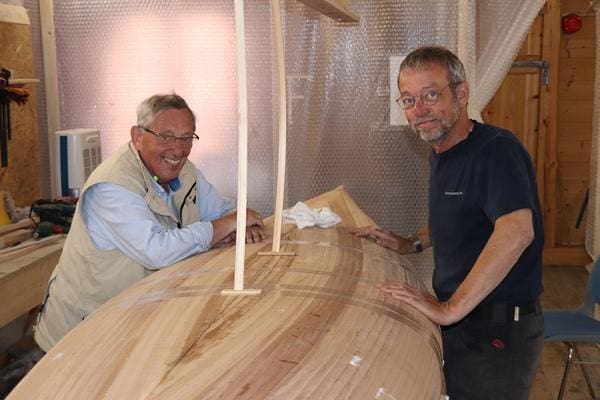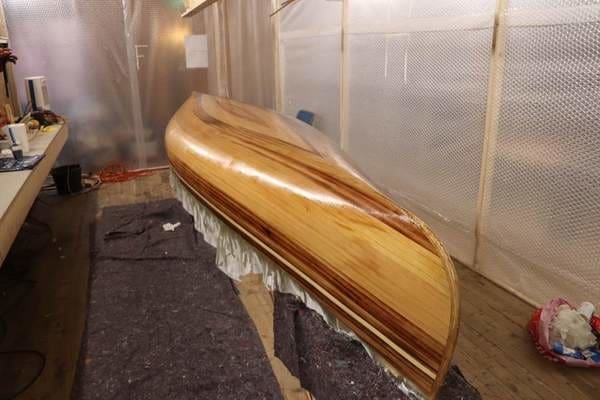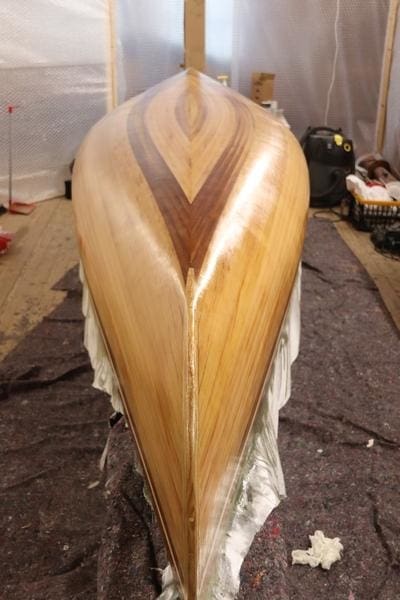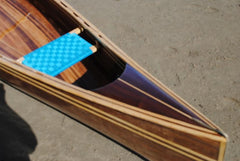How to Build a Stapleless Hull by Svein Løvaas

My name is Svein Løvaas. I am currently situated in Bergen, Norway and I like to build boats! I have built nine or ten canoes, kayaks and small boats based mainly on the knowledge I got from a course at Bear Mountain in 2015.
My strategy has always been: why ruin excellent material such as western red cedar with hundreds of holes? This material is quite unusual in Norway (and Europe in general), and therefore expensive. What this means in practice is that I want to use and present the material in the nicest way possible.
I am now running a course on "strip building techniques" here in Bergen, organized by Kystkultursenteret.
We have a small class consisting of two participants and are in the process of building a 15' Bob's Special. We also hope to have another class in the autumn, and material for a 17' canoe has already been purchased.
We build staple-free, and the process is as follows:

We start with the first plank supported on a jig (made from leftovers from the mold production). Then we stack the planks one by one, clamping each down and inwards using one wedge for downward force and at least two for side force. It is crucial to have the width of a wedge on both the new strip and one on the previous strips for as tight a joint as possible. In addition, I use packing tape between the molds for additional downward force. With this staple free-technique, described in Ted Moore’s book Canoecraft, together with the use of tape and at least two wedges, you get an excellent jointing between the strips, and the need for sanding will be reduced
Using packing tape between the molds provides a good result if you do it right. But it can also cause harm if you do it the wrong way! I learned "the right way" from an experienced kayak builder on the American west coast last summer. The tricks are as follows: If you attach the tape on the inside of the hull just under the last strip and loop it over the top, you pull the strips outwards. This is the opposite of what you want. You should always attach the tape under the first strip and tighten as much you can, beginning from the bottom before pulling it over the top. Then you get the force the right way: down and inwards!

Another issue with building staple-free is the fact that it is difficult to hold the hull tight to the molds. I have solved this issue by using a 10 cm long strip of fibreglass band (5 cm width) tied to half a meter of bungee rope. Lay the fibreglass end of this "tool" over the plank and tighten it up the day after. The angle of each "bungee tool" will be different each time, but 90 degrees on the hull where you placed it will usually work fine. I use 30-40 instances of this special tool on each boat. The trace of this “tool” will disappear after you’ve glassed up your boat. In this way you can hold the hull tight to the molds without staplers. I have used this technique on several boats now and it works!
I addition to this “fibreglass band tool,” I mounted a T-bar (built of 2x4 planks) straight over the strongback and just high enough to not harm my head all the time. I use this T-bar as a support for pressing strips down on the molds, so the bottom holds its shape until the last strips is glued in. A very useful tool!
Questions or comments? Contact Svein through his Facebook page SL Consulting AS.





